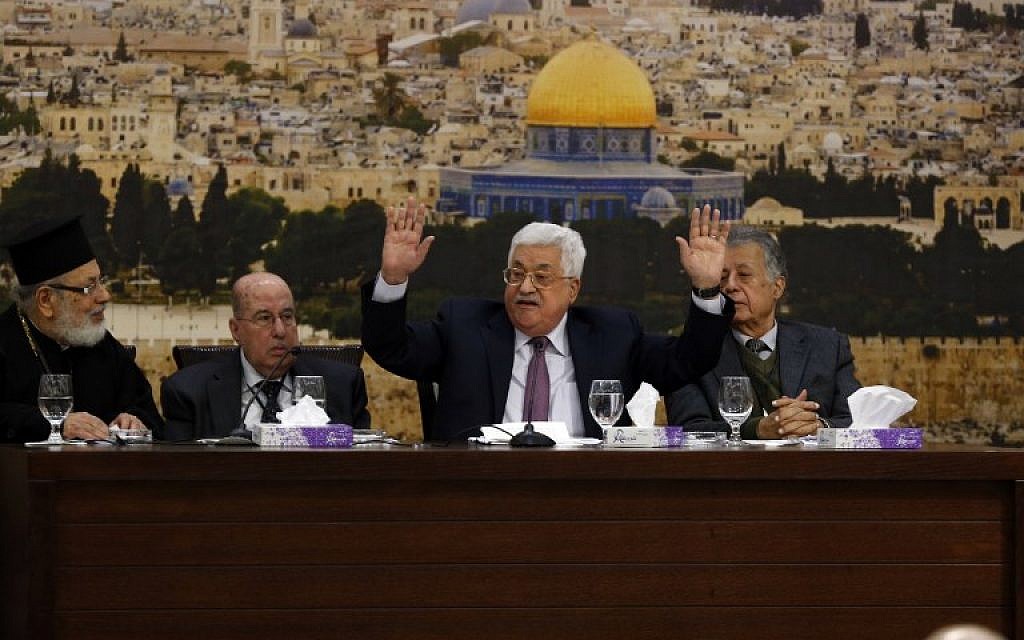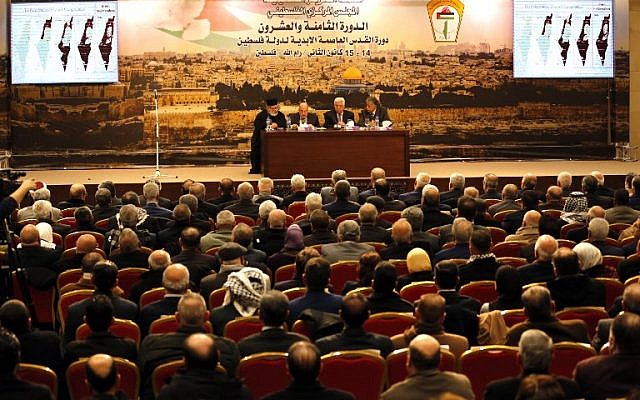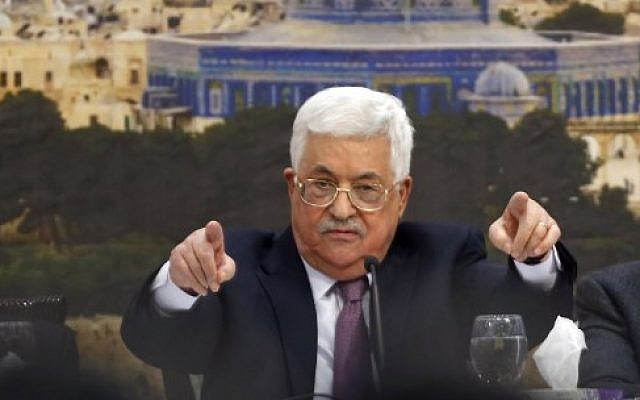Saving his harshest rhetoric for Trump, 82-year-old PA president tells PLO Central Council, ‘This may be the last time you see me here’

Sunday’s address by Palestinian Authority President Mahmoud Abbas to the Palestine Liberation Organization’s Central Council sounded like the farewell of a leader at the end of his political path, and he admitted as much.
“This may be the last time that you see me here,” Abbas said in his speech in Ramallah.
In March, Abbas will celebrate his 83rd birthday, and he will be hard-pushed, in celebration, to point to a single significant achievement over the past few years. With no political solution on the horizon, the idea of a two-state solution becoming a sad joke, and the prospects of a unity deal with the Hamas terror group fading daily, it seems that even Abbas has thrown up his hands in despair.
Telling US President Donald Trump, “May God demolish your house,” could be attributed to the general “Trumpism” which has seized world leaders, but it also points to the deep despair of the Palestinian leadership.
In his first years as Palestinian leader, and especially after Hamas seized control of Gaza in 2007, Abbas succeeding in doing what his predecessor, Yassar Arafat, had not attempted. He ended the chaos that ruled in the West Bank and established a degree of law and order. Together with the Palestinian security forces and with the help of Israel, Abbas managed to stabilize the West Bank and to remove the gunmen from the streets of Palestinian cities. That had previously appeared an impossible goal.
However, since the change of government in Israel, after the resignation of Ehud Olmert — who had offered Abbas the entire West Bank and never received an answer — together with Prime Minister Benjamin Netanyahu’s 2009 election victory, and especially since Trump entered the White House in 2017, the vision of two states realized through negotiations with Israel has evaporated into the thin air of history.

The banner that Abbas waved time after time, as official and unofficial policy — establishing the State of Palestine along the 1967 borders — became an idea disconnected from reality. It is easy to blame Trump for this situation, but to be realistic, that has been the case since 2009.
The rule of Hamas in Gaza and Israeli settlement building showed clearly that the dream was one thing and the reality was another. Trump’s December 6 White House speech, in which he recognized Jerusalem as Israel’s capital, only made matters clearer for the Palestinians, as did the message sent from Saudi Arabia about the “deal of the century” being drawn up by the Trump administration.
The frustration of Abbas and his colleagues was palpable. Furthermore, on Sunday, he did what he is so good at doing — blaming the entire world for the situation of the Palestinians, from the US, to Israel, Hamas, and even the Europeans, for their role in sending the Jews to Israel.
Abbas also dedicated a large part of his address to his internal critics — not only Fatah activists who refused to participate in the conference, but also Hamas and the Islamic Jihad terror groups, who stayed away as well.
Israel, he further charged, destroyed the Oslo accords. “Israel is a colonialist project, which has nothing to do with the Jews,” he added.
Trump gave the Palestinians a slap in the face, he lamented. “The deal of the century became the slap of the century.”
Only a few in the Palestinian Authority and the top echelons of Fatah and the PLO were left off of his list of the culprits behind the failure.

When one looks at the faces of those participating in the Sunday-Monday conference, it is clear how insistently the PLO and Fatah have refused to change or reform. The leaders today are much the same ones who led the PLO in the 1980s in Lebanon and the West Bank.
In this vein, over the last few years, Abbas has made sure that he has no heir, nor even a clear official process for choosing a successor. He ignored calls for reform and any kind of criticism. He made sure to isolate and weaken the most popular leader in the West Bank, Marwan Barghouti, imprisoned since 2002 and sentenced by a civilian Israeli court to five life terms for orchestrating a series of terrorist murders during the Second Intifada.
In what seemed like a valedictory address Sunday, Abbas promised that the Palestinians would not give up their rights, that payments to families of terrorists would not stop, and that he would not allow the Americans to mediate in the negotiations. These and many other “nos.”
“We do not take instructions from anyone, and say ‘No’ to anyone, if it is about our destiny, our cause, our country and our people… 1,000 times no,” he said.
Which left many Palestinians asking themselves a simple question — one that many people in Israel also ask their leaders: “So what is ‘yes?’”
It seems unlikely that the answer will be forthcoming during the Abbas-Trump-Netanyahu era.
As reported by The Times of Israel
